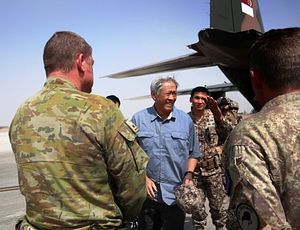This week, Singapore’s defense minister Ng Eng Hen visited the Singapore Armed Forces (SAF) medical team deployed in Iraq which is supporting the U.S.-led Global Coalition to Counter ISIL. The move put the spotlight on the city-state’s deepening role in combating the Islamic State amid growing regional fears about the threat.
As I have noted before, Singapore, a U.S. strategic partner, has long played an important role in terms of regional and global security operations, including in Iraq (See: “Strengthening US-Singapore Strategic Partnership: Opportunities and Challenges”). For instance, in October 2003, as the multinational reconstruction effort was taking shape in Iraq, Singapore began a string of short-term deployments, including transport aircraft and personnel, in what came to be known as Operation Blue Orchid up to its conclusion in 2008.
The city-state has also been a key regional contributor in the fight against the Islamic State (ISIS). Singapore was the first Southeast Asian state to join the U.S.-led Global Coalition to Counter ISIL (ahead of Muslim-majority Malaysia) and had already been involved in several important ways, including in air-to-air refueling, image interpretation, and intelligence gathering and coordination in the Middle East (See: “US To Host Counter-Islamic State Meet Amid ASEAN Terror Fears”).
In 2016, Singapore had said that as part of efforts to deepen its role, it would deploy a medical team to Iraq in 2017. The news was first publicly unveiled by Prime Minister Lee Hsien Loong during a joint press conference with former U.S. President Barack Obama during his visit last October (Lee is due in Washington later this year as well), and was subsequently detailed by Defense Minister Ng Eng Hen (See: “Singapore to Deploy Team to Iraq in 2017 for Islamic State Fight”).
Since June 2017, medical teams from the SAF have been deployed to Iraq where they have been working closely with other countries to provide medical support to coalition forces contributing to counter ISIS. The medical teams had been protected by soldiers from Singapore’s Army Deployment Force (ADF).
On Tuesday, Ng visited the SAF medical team deployed in Iraq. He was accompanied by Senior Minister of State for Defense Mohamad Maliki Bin Osman, Chief of Defense Force Lieutenant-General Perry Lim, Deputy Secretary for Policy Keith Tan, and senior SAF officers.
According to Singapore’s defense ministry (MINDEF), the SAF medical team briefed Ng on their tasks and responsibilities and also demonstrated their in-theater medical capabilities and how they were working with coalition partners during a walkthrough of the medical center.
Ng was also briefed by coalition commanders from Australia and New Zealand, which, in addition to their contributors as U.S. allies in the Islamic State fight, are important bilateral security partners for Singapore in their own right and as participate with the city-state in other broader multilateral forums and engagements such as the Five Power Defense Arrangements (FPDA) (See: “A New Base for Singapore’s Fighter Jets in New Zealand?”).

































